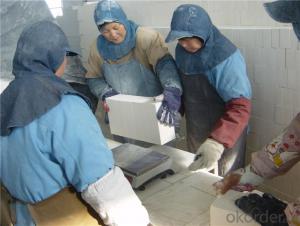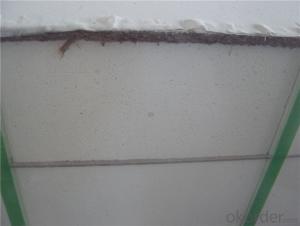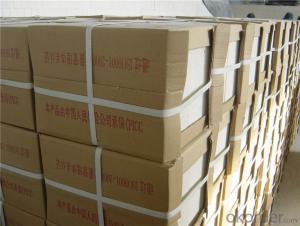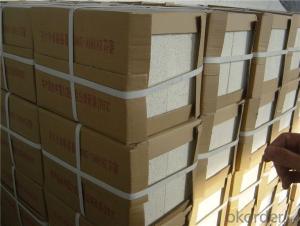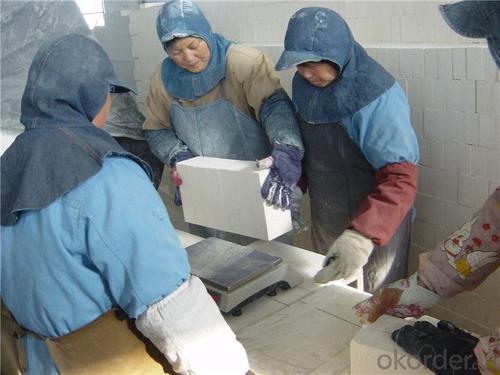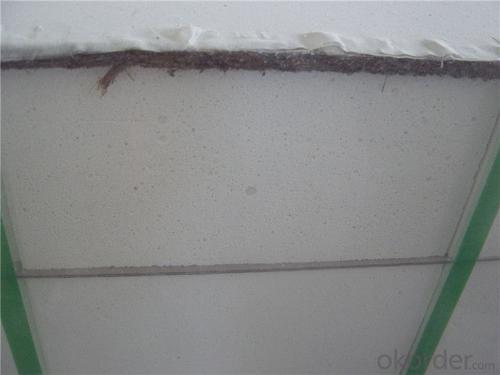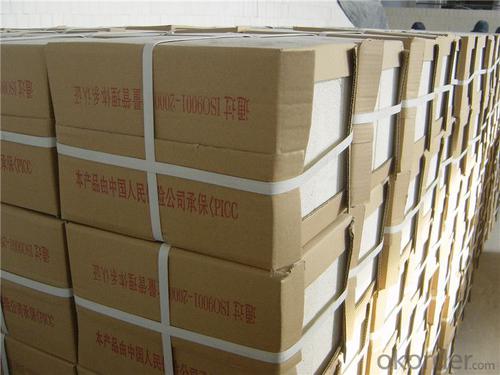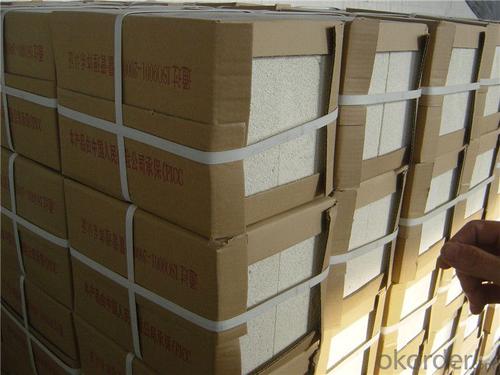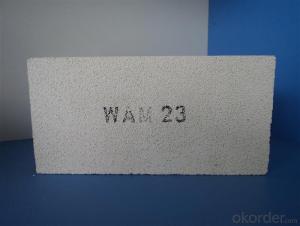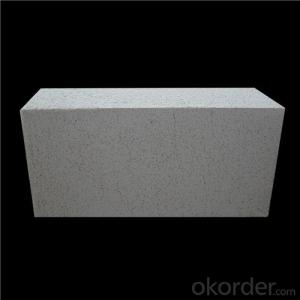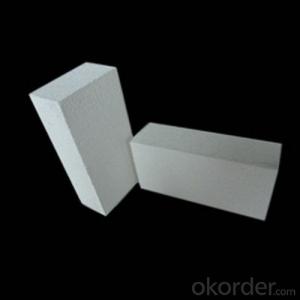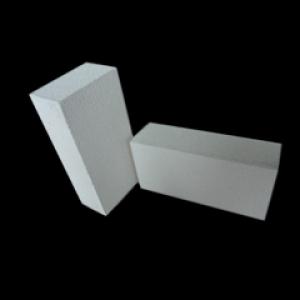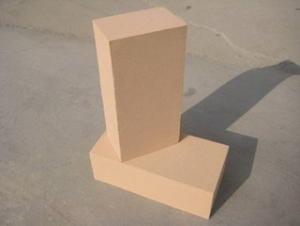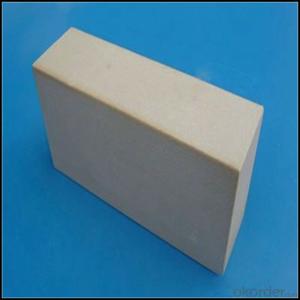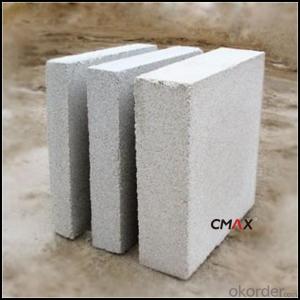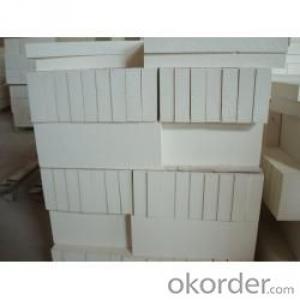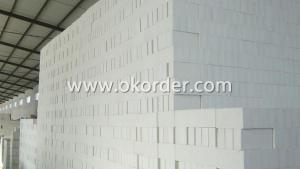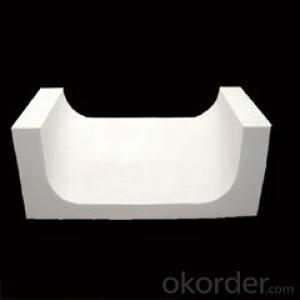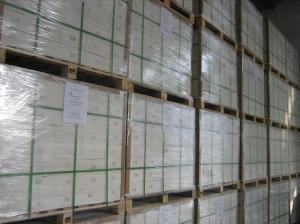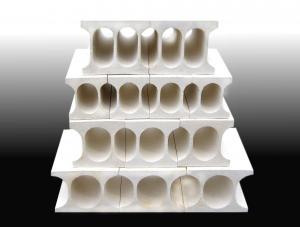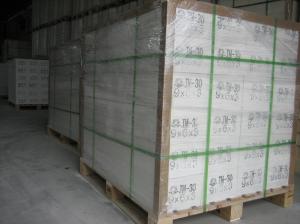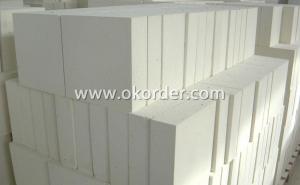High-Temperature Light Weight Fire Clay Insulation Bricks
- Loading Port:
- Shanghai
- Payment Terms:
- TT OR LC
- Min Order Qty:
- 1 m.t.
- Supply Capability:
- 1000 m.t./month
OKorder Service Pledge
OKorder Financial Service
You Might Also Like
Thermal Insulation Fire Clay Brick
Refractory brick is a block of refractory ceramic material used in lining furnaces, kilns, fireboxes, and fireplaces.
We provide high quality Refractory Fire Bricks that are used on wide range in the various industries like Cement, Glass and Steel. Refractory Fire Bricks are provided as per the quantity and specifications required by the customers. We provide an extensive range of Refractory Fire Bricks at reasonable prices that depend upon the quantity ordered.
Application
Insulating Fire Brick are used for the lining of converter, alternating current arc furnace, direct Current arc furnace and the ladle slag line, etc.
Company Advantage
(1)Long Insulating Fire Brick manufacture history: 25 years manufacturer
(2)Advanced equipment
(3)Diversification of production standards: ISO ANSI FEPA JIS ASTM
(4)Flexible payment: T/T L/C D/P D/A
(5)Professional marketing team and after-sale service
Insulating Fire Brick main feature:
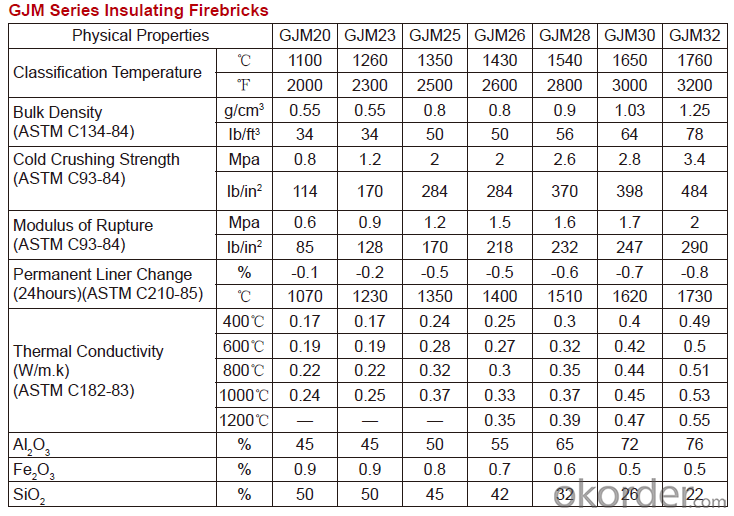
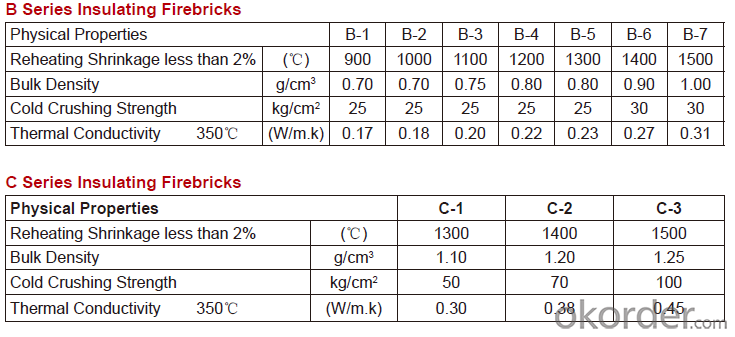
Equipment
1 unit of Ceramic Abrasive (SG Abrasive) pilot production line
2 units of Compact grain Abrasive pilot production lines
1 unit of high-end coated abrasives (abrasive cloth) production line
2 units of Boron Carbide production lines
3 large flexible crushing and sieving lines for grit production lines
6 units of 5000KVA-10000KVA dumping type electric arc furnaces for Brown Fused Alumina fusion
Q1 What’s the transport method?
A1 FCL delivery goods with wooden pallet or wooden case by sea; If LCL delivery, must with wooden case; Sometimes need open top, flat rack or bulk cargo.
Q2 What’s the required payment term?
A2 Generally 30% TT as the prepayment, 70% TT before delivery. If need, 100% Irrevocable Letter of Credit or negotiation.
Q3 Which country are our products exported to?
A3 Apart from entire Chinese market, the US, Russia, Japan, Korea, Australia and some Southeast Asian Nations.
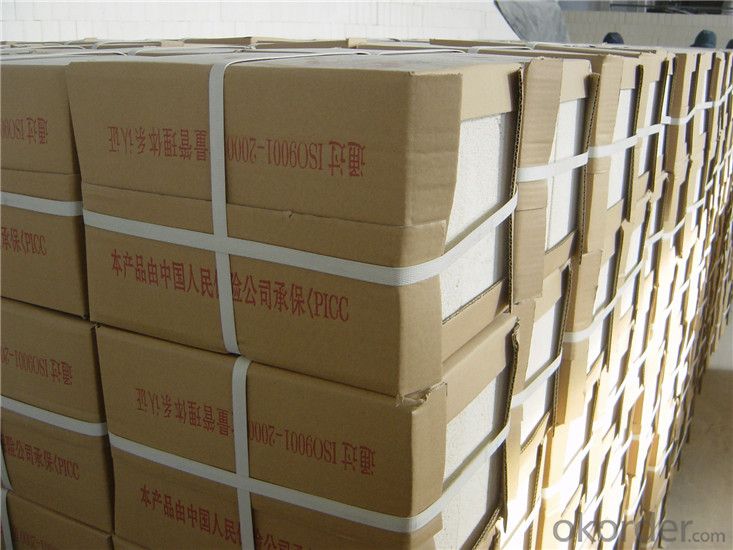
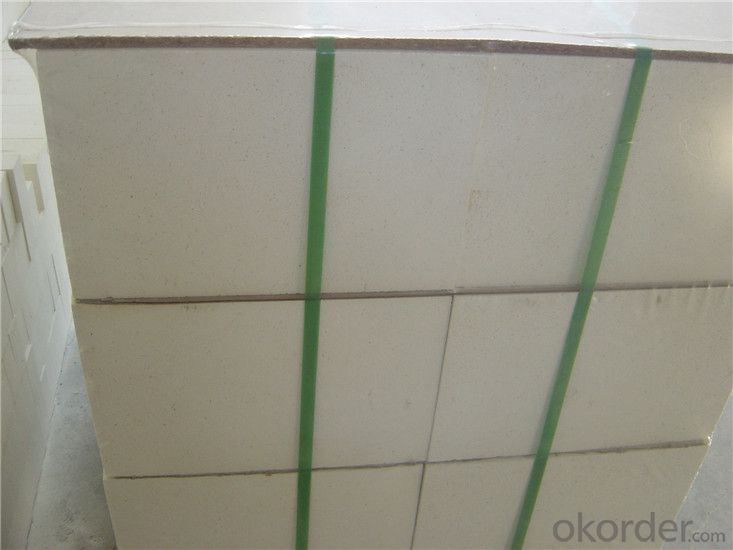
- Q: Do insulating fire bricks require any special fireproofing treatments?
- No, insulating fire bricks do not require any special fireproofing treatments. Insulating fire bricks are made from lightweight materials with high insulating properties, such as refractory clay or ceramic fibers. These materials are inherently fire-resistant and can withstand high temperatures without the need for additional fireproofing treatments. However, it is important to ensure proper installation and usage of insulating fire bricks to maximize their effectiveness and longevity.
- Q: Do insulating fire bricks require any special storage conditions?
- There are no specific special storage conditions necessary for insulating fire bricks. These bricks can endure high temperatures and are usually composed of materials like clay or silica that are heat-resistant. Nevertheless, it is advisable to store them in a dry and covered location to prevent moisture absorption or harm. Furthermore, it is crucial to handle these bricks cautiously to avoid breakage or cracks that could impact their insulation properties. Ultimately, as long as the bricks are stored in a dry and safeguarded setting, no particular special storage conditions are needed for insulating fire bricks.
- Q: Do insulating fire bricks require any special sealing or caulking?
- Yes, insulating fire bricks typically require special sealing or caulking in certain applications. While insulating fire bricks are designed to withstand high temperatures and provide excellent thermal insulation, they can still be susceptible to moisture infiltration and atmospheric gases in specific environments. To mitigate these risks, sealing or caulking is often necessary. Sealing or caulking insulating fire bricks involves using specialized refractory materials or compounds that are resistant to high temperatures and can create an airtight barrier. The sealing process helps to prevent the ingress of moisture, gases, or other contaminants that could compromise the insulating properties of the bricks. The specific sealing or caulking method will depend on the application and the type of insulating fire bricks being used. Some common sealing techniques include using high-temperature silicone sealants, refractory mortars, or coatings. These materials are specifically formulated to withstand the extreme temperatures experienced in high-heat environments. It is important to consult the manufacturer's guidelines or seek professional advice when determining the appropriate sealing or caulking method for insulating fire bricks. Proper sealing ensures the longevity and effectiveness of the insulation, as well as the overall performance and safety of the application.
- Q: Can insulating fire bricks be used for insulation in petrochemical plants?
- Insulating fire bricks have multiple applications, one of which is their use in petrochemical plants for insulation purposes. These bricks possess exceptional thermal properties, characterized by their low thermal conductivity and high resistance to heat transfer. These remarkable features render them suitable for deployment in high-temperature environments, such as petrochemical plants. In such settings, insulation plays a critical role in preventing heat loss and maintaining optimal operational conditions. Moreover, these bricks are not only lightweight but also possess robust mechanical strength. This facilitates their easy installation and ensures durability in industrial settings. Additionally, their resistance to chemical corrosion is a crucial attribute for petrochemical plants that handle a wide range of corrosive substances. Consequently, insulating fire bricks effectively fulfill the insulation requirements, thereby enhancing energy efficiency and promoting safety in petrochemical plants.
- Q: Can insulating fire bricks be used to line industrial boilers?
- Yes, insulating fire bricks can be used to line industrial boilers. Insulating fire bricks are specially designed to have low thermal conductivity, which helps to minimize heat loss and improve energy efficiency in the boiler system. These bricks are made from lightweight materials such as clay and alumina, which have excellent insulation properties. By lining the interior of the boiler with insulating fire bricks, the heat generated by the combustion process can be contained within the boiler, resulting in higher heating efficiency and reduced fuel consumption. Additionally, insulating fire bricks can withstand high temperatures and thermal shocks, making them suitable for the harsh operating conditions often encountered in industrial boilers. Overall, using insulating fire bricks as a lining material in industrial boilers can contribute to improved energy efficiency, reduced operating costs, and increased durability of the boiler system.
- Q: Can insulating fire bricks be used for insulation in aluminum smelters?
- Yes, insulating fire bricks can be used for insulation in aluminum smelters. Insulating fire bricks are designed to withstand high temperatures and provide excellent thermal insulation, making them suitable for use in aluminum smelters where extreme heat is generated.
- Q: Can insulating fire bricks be used in the construction of kilns?
- Insulating fire bricks have the ability to be utilized in the construction of kilns. With a focus on possessing a high insulating value, these bricks can endure high temperatures while minimizing heat loss. This attribute renders them well-suited for the task of kiln construction as they effectively preserve and regulate the desired temperature within the kiln. Furthermore, these bricks are lightweight and easily manageable, adding to their convenience in kiln construction. An additional advantage lies in their resistance to thermal shock, an imperative characteristic for kilns that experience swift temperature fluctuations. In general, insulating fire bricks are a favored option for kiln construction due to their insulating properties, durability, and user-friendliness.
- Q: Are insulating fire bricks resistant to insects and rodents?
- Yes, insulating fire bricks are generally resistant to insects and rodents due to their dense and solid construction, which makes it difficult for pests to penetrate or damage them.
- Q: Do insulating fire bricks require any special tools for installation?
- No, insulating fire bricks do not require any special tools for installation. They can be easily installed using standard masonry tools such as a trowel and mortar.
- Q: Can insulating fire bricks be used in fertilizer plants?
- Yes, insulating fire bricks can be used in fertilizer plants. Insulating fire bricks are known for their excellent thermal insulation properties, high heat resistance, and low thermal conductivity. These properties make them suitable for various industrial applications, including fertilizer plants. In fertilizer plants, there are often processes that involve high temperatures, such as the production of ammonia or the conversion of raw materials into fertilizers. Insulating fire bricks can be used to line the walls, floors, and roofs of the furnaces, kilns, and reactors used in these processes. The thermal insulation provided by insulating fire bricks helps to minimize heat loss, increase energy efficiency, and maintain a stable temperature inside the processing units. This is crucial for controlling the chemical reactions and ensuring the optimal performance of the plant. Additionally, insulating fire bricks have a high resistance to chemical attack, which is essential in fertilizer plants where corrosive substances are often handled. They can withstand the harsh chemicals and gases present in the production environment without deteriorating or compromising their insulating capabilities. Furthermore, insulating fire bricks are lightweight, making them easier to handle and install in different areas of the plant. This can result in cost savings during construction or maintenance activities. Overall, insulating fire bricks are a suitable choice for fertilizer plants due to their thermal insulation properties, high heat resistance, chemical resistance, and lightweight nature. They can contribute to the efficient and safe operation of the plant, while also providing long-lasting performance in the demanding conditions of the fertilizer industry.
Send your message to us
High-Temperature Light Weight Fire Clay Insulation Bricks
- Loading Port:
- Shanghai
- Payment Terms:
- TT OR LC
- Min Order Qty:
- 1 m.t.
- Supply Capability:
- 1000 m.t./month
OKorder Service Pledge
OKorder Financial Service
Similar products
Hot products
Hot Searches
Related keywords
